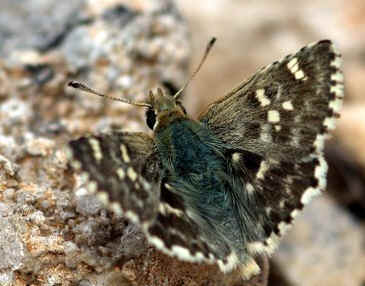In
a village near to the Bay of Jagua (Cienfuegos, Cuba) and long before the
Spaniards arrive, there lived a beautiful Indian woman named Aipiri. She was the
envy of women of the region and allure of men.
Aipiri
liked to call attention, stand out for her way of dressing with colorful outfits
and floral decorations, and because of her skills as a dancer and singer. He had
a lovely voice and was present at all ciboney meetings, being the main
attraction of these events.
The
beautiful young woman shining hair, slanted eyes, fell in love with a
hardworking young ciboney and great hunter. They joined and formed a household.
As natural, over the months, the passion went placating a bit and Aipiri spent
the

A
tatagua moth (black witch)
days
engaged in the housework, waiting patiently for her husband come tired of his
hunting bringing the livelihood of the day.
Aipiri
was bored and being a married woman annoyed her; she wanted to return to her
amusements, she wanted to hear blandishments, to sing, to dance. She wanted to
bewitch men with their friendliness and charm. She was jaded and missed her
former life.
She
gave birth to her first child and boredom became even greater. The girl found no
fun in having to take care of a crying child, day and night.
She
began to leave the house, leaving the baby alone. She joined the neighbors,
going to meetings and parties. Every time she spent more time away from home,
though her husband did not even notice, since Aipiri was very careful to return
home shortly before he returned from his daily job.
Thus,
from getaway to getaway and from party to party, the time passed and they
already have had six children. These poor dears were starving, and their mother
disregarded to take care of them or even to keep them clean; there were like
totally abandoned little animals. The children were crying and crying in that
hut in the countryside where nobody could either hear or help them. They wept
with a “guao, guao, guao”.
But
it turned out that they were listened by the demon Mabuya, an evil spirit that
roamed the region and was very tormented by that sound coming out of the throats
of the children at mourning. One day the demon, in an awful outburst of anger,
decided to shut up once and for ever that “guao, guao, guao”. He turned the
children into bushes of guao (a poisonous plant of Central America).
Poor
little children! Because of the crazy and disobliged behavior of their mother,
they were converted into an awful and cruel shrub that produces sores, swelling
and itching to whom touch it. But it could not stay that way: the culprit was
the mother and, obviously, where there is an evil demon there must be a good
counterpart, then appeared the spirit of good.
When
in the evening Aipiri arrived at home did not find the children anywhere but six
strangers bushes had grown in the garden; the young woman became very nervous:
something had happened that day during his absence.
Suddenly
everything went dark around her! Aipirí felt very small; what was happening to
her? She raised an arm and then the other and – what a surprise – she found
himself pinned to the ceiling! The spirit of good, seeking vengeance for what
she had done to her children, had turned her into a tatagua; she was a moth (Ascalapha
odorata whose common English name is black witch) of the dark and ugly ones
called witches: she was a butterfly witch! And this terrible way, Aipiri paid
for her heartbreak and frivolity.
The
legend points out that the husband of Aipiri looked for his wife and children
for a long time and one day he disappeared from that place and nothing was heard
of him forever.
The
belief exists in the popular myth that if a black witch enters a house this is
an announcement of ill omen. Nevertheless, the intention of the spirit of good
when transformed Aipiri into one of these moth was to warn the mothers that
their obligation was, and still is, to take care of their children and that a
mother should never abandon or neglect her offspring.
Since then the guao is a plant feared and evaded by everyone. The children transformed into bushes are still alone and those who dare to touch them are in danger. While the mother is obsessed with the evil she did to her children, looking for them house to house terrorizing the inhabitants of these, who tremble at her presence believing she is carrier of some misfortune.